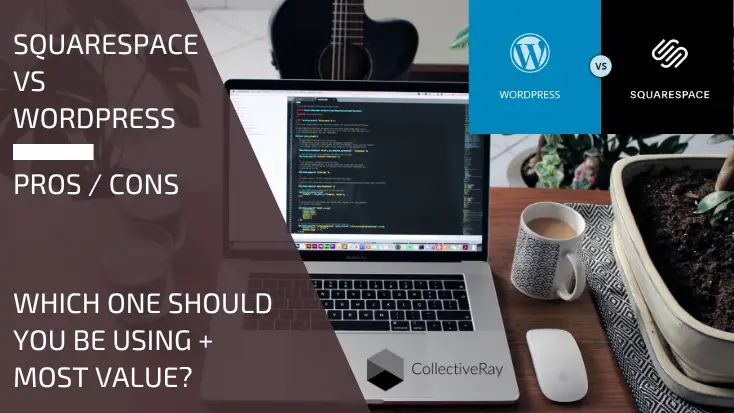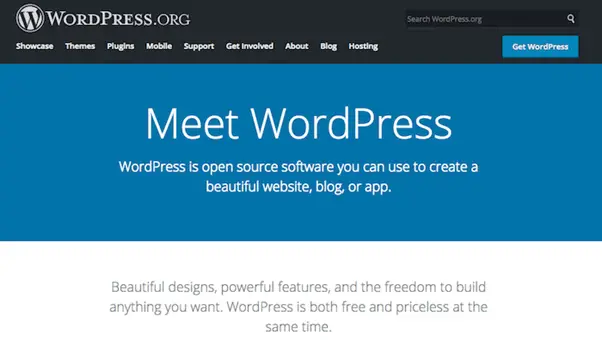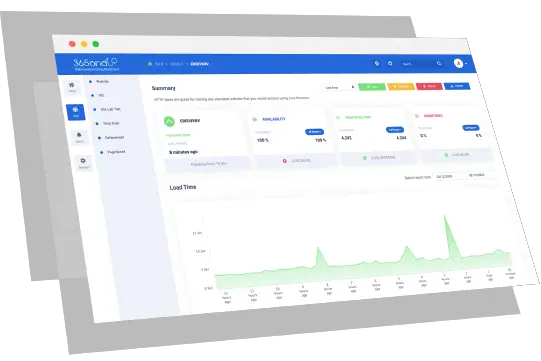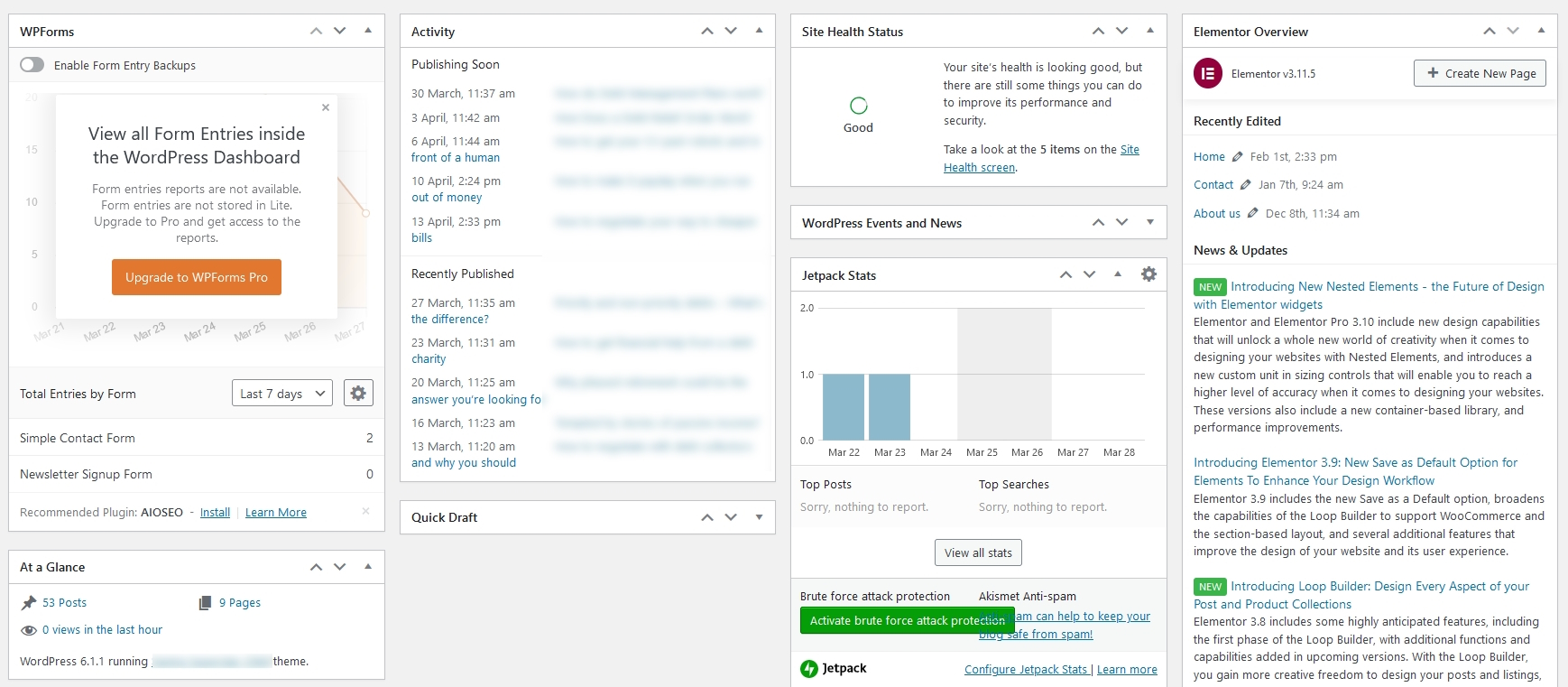
Congratulations, you've successfully reduced your choices to Squarespace vs WordPress. But which one of these two website builders is best for your unique needs?
That's sort of like asking what kind of vehicle you ought to drive. It depends, right?
If you work in the SEO industry, you might know that this answer is received to 80% of questions you ask..but obviously we're going to elaborate.
We realize that's not exactly helpful, but by the end of this article, you'll be able to decide whether to buy a reliable trusty old-timer that will last for thousands of miles or a flashy new toy with more horsepower but more maintenance requirements.
{autotoc}
SquareSpace vs WordPress
Quick overview table of Squarespace or WordPress.
|
Squarespace |
WordPress |
|
|
Ease of Use: |
⭐⭐⭐⭐⭐ |
⭐⭐⭐⭐ |
|
Design and flexibility |
⭐⭐⭐⭐ |
⭐⭐⭐⭐⭐ |
|
Building a website |
⭐⭐⭐⭐ |
⭐⭐⭐⭐⭐ |
|
Blogging features |
⭐⭐⭐ |
⭐⭐⭐⭐⭐ |
|
Ecommerce features |
⭐⭐⭐⭐⭐ |
⭐⭐⭐⭐⭐ |
|
SEO |
⭐⭐⭐ |
⭐⭐⭐⭐⭐ |
|
Mobile app |
⭐⭐⭐⭐⭐ |
⭐⭐⭐ |
|
Uptime and page speed |
⭐⭐⭐⭐⭐ |
⭐⭐⭐⭐⭐ |
|
Backups |
⭐⭐⭐⭐ |
⭐⭐⭐⭐⭐ |
|
Support |
⭐⭐⭐⭐ |
⭐⭐⭐⭐ |
|
Maintenance |
⭐⭐⭐⭐⭐ |
⭐⭐⭐⭐ |
|
Security |
⭐⭐⭐⭐⭐ |
⭐⭐⭐⭐⭐ |
|
Content and data |
⭐⭐⭐⭐ |
⭐⭐⭐⭐ |
|
Pricing |
⭐⭐⭐⭐ |
⭐⭐⭐⭐⭐ |
|
System migration |
⭐⭐⭐⭐ |
⭐⭐⭐⭐ |
|
Multilingual websites |
⭐⭐⭐⭐ |
⭐⭐⭐⭐⭐ |
|
Pros |
|
|
|
Cons |
|
|
|
Verdict |
⭐⭐⭐⭐ |
⭐⭐⭐⭐⭐ |
Squarespace vs WordPress - What’s the difference?
Squarespace is a hosted website builder comes with templates, automatic updates, e-commerce capabilities, and web hosting built-in. It's a cloud service you pay for monthly or yearly that provides most of the tools you need to build a basic website.
WordPress is more flexible and scalable, despite the fact that it almost always needs the use of additional plugins to operate your website fully. It's harder work initially but provides a number of benefits you won't get with Squarespace.
SquareSpace is typically simpler to use and provides the option to enable built-in extras like email marketing, member areas, and appointment scheduling.
WordPress is a better option for bigger websites that need particular features, like support for multiple languages and more complex, customizable features and functions.
Why would you consider WordPress?

42.9 percent of the top 10 million websites in the world currently use WordPress.org.
WordPress can be used to create any type of website. Sadly, there is a cost associated with this.
The primary one is that you will have to set it up on your own domain, which means you are in charge of finding a reputable hosting provider (ideally a specialized WordPress hosting company such as InMotion hosting). We'll go into more detail about the other issues below.
When we refer to WordPress, we mean the self-hosted WordPress.org, not the cloud blogging platform at WordPress.com. Confusing we know, but it's what we have to work
What about SquareSpace?

Squarespace, which debuted more than ten years ago, is one of the industry's heavyweights and is becoming more and more well-known.
With an estimated 1,000 new users signing up for Squarespace accounts every day, it is one of the most popular website builders (especially in the US, Canada, UK, and Australia). However, their user count is not publicly available.
What is the cause of their success? They have succeeded in developing a one-stop shop that makes it incredibly simple for beginners to launch a website in just a few seconds.
Even though it takes more than the minutes it promises, it is still very impressive.
Squarespace handles every aspect of your website, allowing you to select a template and domain name while the service ensures everything runs smoothly for you.
So does it outperform WordPress in every regard?
Let's dissect it in more detail:
Ease of use
Let's start with the basics in this SquareSpace vs WordPress showdown.
The good news is that Squarespace is a very beginner-friendly platform, using a visual drag-and-drop editor that enables you to move content around with your mouse.
If you consider yourself to be a complete n00b when it comes to technology, if you don't even know what a n00b is, or if the word "plugin" sends you running for the hills, then here's the good news:
The only skill you'll need to know to create a new website is how to click your computer mouse, though it's important to note that there are other website builders available that are even simpler to use.
For anyone who is afraid of source code, this is pretty good information.
With the introduction of the Gutenberg update (now called the WordPress block editor), WordPress recently enhanced its editor and added a building block system akin to Squarespace.
Recent updates renamed Gutenberg to the WordPress block editor and brought it more in line with popular page builders like Elementor or Beaver Builder.
This means it's a much closer competition between Squarespace and WordPress now.
You will nevertheless need a basic level of technical knowledge. Even though some hosting companies offer "one-click solutions" to install WordPress, you will occasionally need to deal with updates.
It would also be helpful if you knew how to manually update your plugins, knew how to use FTP to upload files to your website, and maybe even knew how to use databases like MySQL if you want to do really advanced things.
In general, WordPress has a steeper learning curve than Squarespace even though it's still relatively easy.
Winner: Squarespace is without a doubt the easiest platform to use. WordPress is relatively easy to learn but you'll still need to figure stuff out.
Squarespace vs WordPress : Design and flexibility
You're creating a website design, so it's time to compare the design features of Squarespace vs WordPress.
The website templates available on Squarespace are pretty good. Additionally, there is a respectable selection to choose from; the most recent Squarespace update added about 110 new templates to the library in addition to the more than 100 already present.
Due to their responsiveness to mobile devices, they all display flawlessly on smaller screens.
It's important to note that the templates from the most recent release function slightly differently from the templates from earlier releases.
Thanks to the introduction of pre-built sections that allow you to mix and replace designs, you have more layout flexibility.
You can't change templates once you've chosen them. That's quite the limitation and means you'll need to choose very carefully when setting everything up.
Squarespace templates also have another significant drawback. They do have a very fashionable appearance when you pick them up, but that is only because they have been expertly designed with large, lovely images.
Your beautiful website might end up looking a little bit cheap if you can't access background images or logos of the same quality.
WordPress handles templates differently.
The platform offers basic templates for free with the CMS, Twenty Twenty Three, Twenty Twenty Two and so on.
But there is also a huge third-party martket for WordPress themes.
You can choose from an almost infinite number of paid and free templates with WordPress, and there are practically infinite possibilities for customization.
Additionally, these themes are also mobile-responsive, just like Squarespace's (unless you pick an ancient one).
While this is excellent news for those who are very clear about the design they want for their website, it also means you'll need to expend effort selecting your theme and getting to grips with it.
Winner: A challenging one but we're giving this to WordPress. You have virtually limitless options and complete design flexibility and you can change it once you have chosen it. Squarespace's templates are much simpler to customize but you give up some of your customization options. Plus, once it's in place, you're stuck with it.
Building a website
We talked about ease of use, but how straightforward is it to create a website with either of these platforms?
Squarespace makes it easy with its online site builder. Simply answer a few basic questions about why you want to create a website, choose a design, add some personal touches and you’re good to go.
Building features are limited to the basics but everything is very easy to use and you’ll end up with a credible website at the end.
There’s a basic page builder where you can add or remove page elements, change the colour, font and add or remove images.
That’s about it though. You can change a lot about a template but you’re constrained in many ways by the layout of the design.
The downside of all that is most websites will look just like other websites created with that template.
WordPress also makes it easy but not quite as easy as Squarespace. However, the depth and breadth of the page building tools is huge.
New updates have added the WordPress block editor, a simple page builder baked into the CMS.
WordPress is compatible with drag and drop page builders like Elementor and Beaver Builder and you also have readymade templates.
You can import a readymade template at any time or build one from scratch if you know how. You can then change every aspect of most templates, from the header all the way to the footer.
Using a page builder is incredibly simple. Just open a page within the builder, add, move or remove blocks as required and customize any element of any block.
You can also change navigation, add page elements, use plugins to add blocks and let your creativity roam free.
There are very few constraints when designing a website with WordPress. That’s even more true if you use a template that works with page builders or flexbox containers.
Winner: WordPress. You’ll need to do more work but many of the templates are higher quality than Squarespace and you have drag and drop page builders to help. The clincher though, is the ability to create literally anything you like.
Blogs - Which platform offers the best blogging features?
There's a reason why WordPress is so highly praised by bloggers. The first version of WordPress was created as a blogging platform, and the selection of tools available today is truly impressive.
So this feature is clearly an edge for WordPress when you compare it against Squarespace.
You name it, there are plugins for it: membership sites, galleries, grammar checkers, author profiles, translations, and pretty much anything else.
If search traffic is significant to your website, you'll also discover that WordPress provides an unparalleled capacity for you to optimize your site, with plugins like Yoast SEO.
This plugins and others like it give you complete control over specific post settings (more on that below).
WordPress provides a respectable selection of blogging tools to get you started, even without any installed plugins.
Most website builders don't even offer features like commenting, post scheduling, RSS, or the ability to save drafts and preview posts.
However, setting up a WordPress blog requires a little extra work (as with WordPress sites in general).
Squarespace is actually one of the top contenders for those who prefer a lower-maintenance option but still want blogging features.
The majority of Squarespace's blogging tools are already integrated into the platform and available for use right away.
These include author biographies, categories, post scheduling, social media sharing, and RSS feeds.
With just a few clicks, you can add more complicated elements like galleries and forms, using the inline blog editor's high level of flexibility.
Advanced features like podcast hosting and the capacity to directly publish to Apple News are also impressive.
Squarespace also offers connections to services like Bandsintown, SoundCloud, Amazon, OpenTable, and others.
Winner: Thanks to its enormous selection of adaptable plugins, WordPress is the more powerful of the two and has to win this round. Squarespace is a decent alternative for those looking for a simpler-to-manage solution though.
Ecommerce features : Adding a shopping cart

Once more, Squarespace comes pre-loaded with a very useful, effective, and straightforward online shopping platform for your website.
To build an online store and add products you can quickly insert a product page into your website.
Your inventory is under your control. Product variations are an option. You can control shipping choices and coupon policies.
Additionally, you can sell subscriptions along with physical and digital goods.
You can even integrate your shopping platform with other services like Xero for accounting and Mailchimp for mailing lists. You can connect it to hundreds of other email services and CRM tools thanks to their integration with Zapier.
Additionally, it provides you with a respectable selection of payment processors, including Square for Point of Sale support, ApplePay, PayPal, ApplePay via Stripe, ApplePay, Afterpay, and credit cards via Stripe.
With Squarespace, e-commerce is already available with the Business plan for $23 per month.
However, bear in mind that Squarespace deducts a 3% commission from each sale.
If you anticipate making more than $3,000 annually, we advise you to take into account the Basic Commerce plan ($27/month), at least because there is no sales commission associated with this plan.
Real-time shipping rates are currently only available for the US, which is the main disadvantage. The same is true for automatic taxes, which are accessible through TaxJar integration.
Additionally, the top-tier ecommerce plan is the only one that offers abandoned cart recovery emails, a feature that is common in most ecommerce solutions.
The WooCommerce WordPress plugin serves as the industry-standard e-commerce solution. It has even more functionality than a Squarespace online store and is open-source as well.
Other plugins such as SureCart, can manage your tax settings more effectively and find a ton of other add-ons, like the ability to add more shipping carriers.
Please be aware that many of these WooCommerce extensions are fee-based.
Setting up a WooCommerce store requires much more work than it does for any other WordPress website.
To get your store exactly how you want it, be prepared to invest time (or money, if you're hiring a developer) in customizing themes and enabling extensions.
Remember that Shopify exists if you're looking to create a sizable online store.
Winner: Smaller stores can benefit greatly from Squarespace's e-commerce solution. Larger stores are better suited for WooCommerce. Your particular project will determine your individual winner. This round in the Squarespace vs WordPress head to head is a tie.
SqaureSpace vs WordPress SEO
You must use the best SEO techniques if you want to differentiate yourself in a highly competitive niche.
Once more, Squarespace makes things simple.
You can quickly edit title tags, meta descriptions, custom URLs, and even ad 301 redirects with this service.
We also need to point out that, in comparison to other platforms, Squarespace's templates typically take longer to load because they are frequently content-heavy and demand high-resolution images.
If your site is going to rely on search traffic, it's important to keep in mind that this will have a negative impact on rankings.
Because of all the plugins available, WordPress is very effective when it comes to SEO.
But once more, you'll need to put in a little extra work to finish the job.
You have two choices: you can perform your SEO manually or you can use specialized WordPress plugins that make it simple to quickly fill in fields with your Google-friendly information.
Yoast SEO, a free plugin that offers advanced features like real-time page analysis, image titles, optimization choices, and XML sitemaps, is one example. (You can find a lot more if you simply type "SEO" into the WordPress plugin page.)
Winner: WordPress's extensive library of plugins really puts you in the driver's seat when it comes to optimizing your site, even though Squarespace does SEO better than most website builders, it''s not as good as WordPress.
This SquareSpace vs WordPress showdown is getting hot!
Mobile: How easily can I edit my site on the go?

Even though we definitely wouldn't advise running your website entirely from a mobile app, it's crucial to be able to quickly edit posts and pages on the go.
Let's look at the mobile apps provided for this purpose by Squarespace and WordPress.
The mobile WordPress app is accessible on both iOS and Android devices. You can edit and create posts, upload files, manage comments, and access statistics with ease. It's simple to use.
However, you'll also need to install the Jetpack plugin in order to view statistics and receive notifications on your device.
The Squarespace app, which is accessible on both Android and iOS, takes things a step further.
One benefit is that you can view stats and get notifications without installing any additional plugins.
The design of your entire site can actually be managed from the app, which is the most significant feature. You can alter the fonts, colors, animations, page layouts, and section breaks all from your mobile device.
You can modify pages, blogs, and SEO settings in terms of content. Again, we wouldn't advise it for setting up your entire site, but it's helpful to know that if necessary, you can make these changes without a desktop.
If your Squarespace website has an online store, you can use the app to manage orders, inventory, and discounts.
Winner: Squarespace wins this because you can manage most aspects of your website through this mobile app, which offers a lot more functionality than the competitions. WordPress offers a lot, but not quite as much.
Uptime and Pagespeed / Core Web Vitals

In keeping with the topic of search engine rankings, here is a crucial factor to consider: the speed of your website.
So this aspect of Squarespace vs WordPress is another important one.
Google favors websites that load more quickly. It evaluates a website's speed using a variety of factors, such as how responsive the website is and how quickly it loads on a mobile device (if you want to test a website yourself, you can use websites such as Webpagetest.org or Uptime Robot.)
As we already mentioned, Squarespace's outcomes are only fair.
Although all of their templates are responsive and mobile-friendly, the page speed tests don't look great and can be slow on mobile devices.
It is important to note that all of their servers are located in the US, which might cause delays if you are primarily serving customers from other regions.
The speed of WordPress depends on the web host you choose. Before choosing a WordPress host, be sure to look at uptime and speed analysis.
After that, you can adjust your template to make it more quick and responsive, either manually or by utilizing those incredibly helpful plugins that allow you to optimize image size and take advantage of browser caching.
Winner: Without a doubt, WordPress. It's faster and has many more tools for optimizing performance.
Backups: What if things go wrong?
If you're going to experiment with your site, it's always a plus to have the backup option. For instance, altering fonts, styling, or other design components.
Despite the fact that neither Squarespace nor WordPress have an integrated backup solution, one platform stands out.
With WordPress, your web hosting provider typically has your back.
The good ones offer the ability to backup and restore data. For instance, Siteground and Kinsta both offer one without charging extra. Cheaper hosts might levy a small premium.
Additionally, you can use WordPress backup plugins to add that extra layer of security.
Squarespace is a little more challenging in this regard. Your blog posts can be preserved as an XML file. You can import this once more to your Squarespace website.
But keep in mind that moving content to another platform is the feature's primary goal (such as WordPress). As a result, it won't be as practical as a separate backup and restore feature.
There is nothing for content that is not blog-related. Users of Squarespace generally endorse the Site Duplication function, which will duplicate your website.
But once more, this is not really the best answer to our issue. So as you can see, there are some workarounds but neither is perfect.
Winner: WordPress is the clear winner here. Web hosts usually offer backups and you can use your own backup plugins for extra reassurance.
Support: Who will help me at 3 am?

This is a huge plus for Squarespace in our Squarespace vs WordPress ultimate bout. They provide live chat and dedicated personal email support for each option they provide.
With these guys, you'll never feel alone, so if you require assistance with setup or when attempting to upload cat pictures to your blog, you know exactly who to contact.
In-depth knowledge bases, videos, webinars, forums, and more are available to help you at every stage.
WordPress is more of a mixed bag. Yes, you do gain from a sizable user base and extensive documentation and you'll find plenty a WordPress tutorial, but it can get challenging finding a solution to your issue quickly.
However, if you don't know your CSS from your jQuery, conversations can quickly turn into something very geeky and frustrating.
But if you buy a paid WordPress theme, they will usually come with customer support so you can get in touch with them to make any changes you want to the design.
Additionally, WordPress hosts will also offer support. It will typically cover hosting, WordPress, your theme and plugins.
Winner: It's a tie. Squarespace offers built-in support from a single source. You'll need to work a little harder with WordPress but there's much more support out there when you need it.
Maintenance
Once your website is up and running, how easy is it to look after? Can you make changes or add features?
Squarespace makes maintenance easy as there isn’t any.
There are no updates to worry about, no plugins or themes to manage, backups are taken care of and security is managed for you.
It’s about as easy as it gets to look after a Squarespace website.
Admittedly you don’t get to see many of the changes or improvements unless there’s a notification but the hands-off approach definitely has its benefits!
If you run a Squarespace store, your maintenance tasks will mainly be around products and running the store rather than running the platform. It’s one of the lowest effort ways to run an online store there is.

WordPress is also relatively low maintenance but it does require maintenance.
There’s core WordPress updates, theme and plugin updates, checking links, monitoring disk usage, keeping an eye on security and a number of other tasks you’ll need to take care of.
They are all relatively straightforward and plugins can automate many of them. But it’s still time you’ll need to take out of your schedule every couple of weeks to manage.
The same is true for store owners. If you use SureCart or WooCommerce, you’ll need to keep them updated, monitor sales, abandoned carts and all those activities as well as purchases.
It isn’t all that much of an overhead but there’s more to do here than with Squarespace.
Winner: Squarespace. As it’s a cloud solution, there is no maintenance.
Security
Once your website is up and running and you’re starting to generate money or attract visitors, keeping everyone safe is essential.
If you pour your heart and soul into a website, you want to keep it safe. So which protects you better? Squarespace or WordPress?

Squarespace calls it ‘white glove security’ for some reason. The platform offers SSL certificates for every domain, DoS protection (Denial of Service), two-factor authentication for logins and an activity monitor for your site.
Squarespace also has network protection in place. They have a 24/7 monitoring centre and comply with GDPR and PCI regulations in their respective regions.
While no website is immune to hacks or attacks, Squarespace offers decent protection as part of the price.
WordPress handles security a little differently.
WordPress itself is very secure and is made more secure with every update. However, the platform doesn’t have its own security measures.
Your web host will be responsible for providing SSL certificates, DoS protection, network monitors and other layers of security.
Some web hosts will offer basic protections while others will go all the way with full DDoS protection, WAF (Web Application Firewall), network monitoring, IP filtering, 24/7 monitoring, malware scanning and more.
Much will depend on the host you work with and the plan you choose.
You can also use security plugins to add more protection, which we recommend doing.
WordPress security plugins can add software firewalls, two-factor authentication, logging, blacklists and other security measures.
You can then add extra protections such as backup plugins, CDN protection and perform simple changes like disabling the /wp-admin URL.
Winner: This result is a little nuanced. Squarespace deserve credit as they handle all security for you. However, WordPress provides more control over security, leaving some of the choices entirely up to you.
It means more work and more configuration but also means you know exactly what’s going on and have much more control over everything.
Squarespace gets the win if you’re after usability. WordPress gets the win if you want control over security and lots more options. Let’s call it a tie to be fair to both.
Content and data
Websites are made up almost entirely of content and data. From the theme all the way to blog posts and product listings.
So how do Squarespace and WordPress keep your data safe?
Squarespace offers a mixed bag. We have all the protections you saw in the security section plus specific data security measures to keep you safe.
Those protections include proactive monitoring, regular penetration testing to help identify weak points in the network, controls over permissions to access your website, two factor authentication and other protections.
However, Squarespace owns the platform and everything on it, including your content and any data stored within your website.
That doesn’t mean they will copy it all and use it for their own ends, but the ownership question is a big one.
If you would prefer to be responsible for your content and own it, perhaps a cloud solution isn’t for you.
WordPress does things differently. You install it on your own web host, using your own account. You own the website, the data and whatever is stored on it.
There is more work involved as we have already established. But the upside is that you have full control over everything.
You’re not dependent on someone else’s terms and conditions and you control what happens to every single byte on your website.
While that does come with added responsibility, if you’re willing to trade off a little ease of use for that control, WordPress is the one you want to use.
Winner: Another nuanced result. Squarespace definitely offers the easiest way to run a website and create content but limits your control of that content.
WordPress offers full control over everything but will require a little more effort to do it.
As advocates of data security and personal choice, we would give the win to WordPress.
Pricing - Who gives the better deal?

The million-dollar question. Which one is cheaper? Well, here again it depends.
So let's see how Squarespace vs WordPress compare to each other.
Squarespace pricing
Squarespace offers very transparent pricing plans, and you can easily determine how much it will cost you annually, everything included: $14 per month for a personal website; $23 for a business website; $27 for a simple online store; or $49 for a sophisticated one.
Not incredibly cheap, but simple to calculate.
Keep in mind that extras like email marketing, member areas, and appointment scheduling have a price. If you require these solutions, be sure to include them in your budget as they will raise your monthly expenses by an additional $10 to $70.
We've partnered with SquareSpace to give our visitions 10% OFF any plan. Use Coupon Code, Collective10 when checking out.
Get 10% OFF from SquareSpace in January 2026 ONLY
WordPress pricing
When using WordPress, you need to factor in web hosting, the cost of your website theme, and the cost of additional plugins.
If you choose to host your WordPress website on a budget and don't care about speed, you could pay as little as $4 per month. We would recommend quality hosting though.
The hosting from InMotion is generally recommended; it costs $3.49 per month.
Winner: Given that you can find reasonably priced hosting and don't need a significant number of extra features, WordPress is the more cost-effective option here, despite Squarespace's transparent pricing.
System migration : Will they let me go?
Can't decide what to do? The good news is that you can always switch platforms for your website's content.
Squarespace does include an import/export feature. But bringing something in is simpler than sending it out.
For instance, when exporting to WordPress, the CSS (i.e., everything style-related) will be ignored and you will need to manually manage your images.
As Squarepsace is a premium product, it's more in their interest to let you import rather than export (leave). That shows in how easy, or not, it is to do either.
Squarespace doesn't currently permit the migration of items like audio, video, events pages, or product pages, which can be a major issue for online stores.
It's possible but not easy to import or export from Squarespace. You can do it but it won't be as straightforward as you might like.
If you want to import or export into WordPress, you will need to add a free plugin called WordPress Importer to make life easier. Despite the name, the plugin lets you export too.
Additionally, since you won't be able to copy a website's style, you'll probably need to start from scratch when redesigning it.
Winner: Importing into Squarespace is simple but exporting out is not. Importing in or out of WordPress is slightly more difficult but there's nothing in your way.
Let's call this one a tie to be generous.
Let's find out if it's really a good fit for you now.
If you want to confuse yourself even further you might want to check out or WordPress vs Wix comparison.
Multilingual websites
Multilingual websites are essential for any business that wants to appeal to a global market.
Around 1.5 billion people speak English but there are now 8 billion people in the world.
If your website is only in English, you’re potentially missing out on a huge market. What business can afford that?
So how do Squarespace and WordPress handle translation?
Squarespace works with Weglot to provide translated pages. As long as you’re using version 7.1 and above, Weglot can translate your pages and add a language selector to your menu.
Setup is simple, you just need to enable the option within your dashboard.
You get 2,000 words for free before you have to pay for translation.
Once you use up your free words, things become expensive quickly, with plans starting at €15 per month for just 10k words.
You can also create your own translated pages and add the content to pages as you see fit.
As you’ll probably expect, translation is your responsibility if you use WordPress. The good news is, you have lots of plugins and translation services to help.
There are no limitations and you’re not restricted to a single translation service. You can use Google Translate, a human translator or any solution you wish.
Some of those solutions will be free while others will require some form of payment. The difference here is that you’re free to shop around to find the solution you want.
Google Translate will be good enough for basic translations with a little human editing. Otherwise, you can use a translation plugin, human translation service, a freelancer or anything you like.
Winner: The winner here must be WordPress. It involves more work but you’re free to choose your own translation service and can set it up however you like. Squarespace is good, as is Weglot, but it works out expensive for larger websites.
Pros of Squarespace
Pros of Squarespace include:
- Zero maintenance
- Readymade templates with basic page builder
- Security and updates are all taken care of
- The platform handles everything so you can grow your website
- 24/7 support from a dedicated team
Cons of Squarespace
Cons of Squarespace include:
- More expensive than WordPress
- Lack of control over templates
- Websites can look similar no matter how much effort you put in
- Your data is stored on someone else’s systems
- No control over security
Pros of WordPress
Pros of WordPress include:
- Free and open source platform
- Full control over every aspect of your website
- Huge range of free and premium readymade templates
- There’s a plugin for every possible feature
- Huge user base with lots of resources to help
Cons of WordPress
Cons of WordPress include:
- Requires more work than Squarespace
- With control comes responsibility
- Many themes and plugins cost money
- Performance reliant on quality web host
- You’re in charge of securing your website
Squarespace is better for:
What type of user would benefit most from using Squarespace?
- You want a website without spending too much time on setting up
- You’re more concerned with running a business than a website
- You’re more interested in usability than design
- You’re happy to pay for someone else to look after your site
- You’re new to websites
- Low maintenance appeals to you or your goals
- The idea of 24/7 support makes you feel secure
- Data ownership isn’t a primary concern
Those are just a few of the use cases for Squarespace but you get the idea.
WordPress is better for:
What type of user would benefit most from using WordPress?
- Anyone who wants full control over their website
- You don’t mind a little maintenance and setup
- You want form and function, not one or the other
- Uniqueness appeals to you
- You want to learn how your website works
- You consider more work a good price for more security
- The idea of adding themes and plugins doesn’t bother you
- You want to build a hybrid site with memberships, store or other features
Those are just a few use cases for WordPress. We’re sure you can think of many others.
Squarespace vs WordPress FAQs
Which is better for blogging, WordPress or Squarespace?
Although Squarespace has some excellent built-in blogging tools, WordPress still reigns supreme for blogging platforms. It has a ton of robust blogging tools that are perfect for doing what it was designed to do.
Should you use Squarespace or WordPress to install SEO plugins?
Squarespace doesn't support SEO plugins, only WordPress does. You can use powerful tools like Yoast on WordPress by installing SEO plugins. Squarespace is a better option if you want built-in features and a lot less work. When it comes to SEO, WordPress will have more flexbility in what you can do, especially when it comes to more advanced functions.
How do I transfer my WordPress-based website to Squarespace?
Squarespace has an integrated import tool for transferring your WordPress site as well as educational guides to help you through each step. Setting up a Squarespace site, selecting a design, and using the advanced import option to move content from your WordPress.org site are all fairly simple steps.
Which is easiest to build websites Squarespace or WordPress?
Squarespace makes it marginally easier to build websites but WordPress isn’t far behind. Squarespace uses a simple page builder and templates to help you build your site. WordPress supports drag and drop page builders and thousands of templates to help you do the same.
Does Squarespace have a free trial?
Yes, Squarespace does have a free 14 day trial. You’ll need to sign up with your email but then you get full access to the page builder and can play around with everything before you commit.
Which of SquareSpace vs WordPress is best for small business?
When it comes to small businesses, WordPress and Squarespace offer different benefits. WordPress is highly customizable and scalable, making it a good choice for businesses that want full control over their website's design and functionality. It's also a cost-effective option, but requires more technical knowledge. On the other hand, Squarespace is user-friendly and has professionally designed templates that look great out of the box. It's an all-in-one platform that includes hosting, security, and support, making it a more convenient option for small businesses that don't want to manage their own hosting. Squarespace also includes e-commerce functionality and is highly secure. Ultimately, the choice between WordPress and Squarespace depends on your specific needs and preferences.
Squarespace vs WordPress : Final thoughts
So who is the winner when it comes to SquareSpace vs WordPress?
Here's the verdict: rather than simply asking yourself "what kind of website do I want now," you should really ask yourself "what kind of website will I want in a year?"
What we're trying to say is that Squarespace is probably the best option for you if you only need a basic blogging and e-commerce solution that works right out of the box.
The same is true if you don't mind spending a little more money to avoid writing a single line of code (or deal with web hosting, security and updates).
But if you have ambitious plans for your website, choose WordPress. Yes, it will take some time and effort (and perhaps money as well), but the variety of options is incomparably small compared to the competition.
You won't be able to get features like multilingual support, specific templates, and searchable databases with Squarespace.
Don't forget that there are other website builders available as well, which throws another wrench in the works.
There are many other services that are even more user-friendly for beginners, like Wix, but there are also others that are more appealing to designers, like Webflow.
